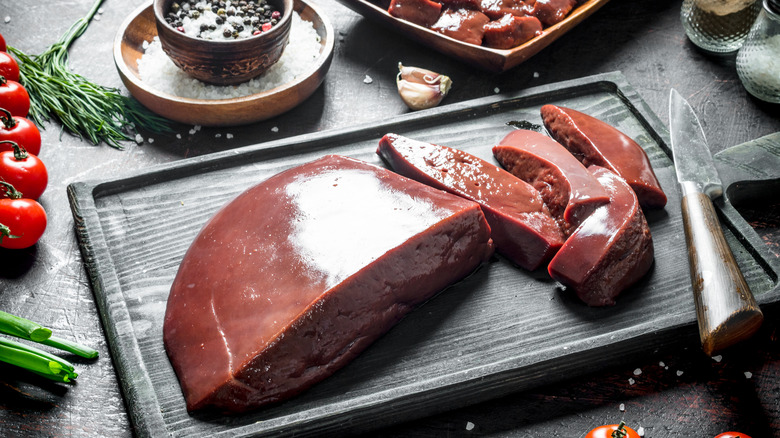What Does It Even Mean To Have An 'Acquired Taste'?
Have you ever been baffled by how much you dislike a certain food, only to have a diehard fan tell you, "It's an acquired taste," as though someday you'd like it? Perhaps you had a sip of coffee as a kid and questioned adults' judgment or heard people tell someone that nobody drinks alcohol for the taste. Acquired tastes are commonly associated with coffee, beer, raw oysters, vegetables like broccoli and brussels sprouts, fermented foods like kimchi, fish products like anchovies and lutefisk, strong cheeses, and organ meat dishes like liver and onions and haggis (per HowStuffWorks).
While many of these foods are merely unfamiliar to those opposed to them, they also have powerful, unique smells and flavors. Stinky, fishy, gamey, intense, and ammoniac are much more complex than simply sweet or savory, and sometimes it comes down to personal preference whether or not we enjoy such characteristics. Unfortunately, a poorly prepared dish can also taint our perception of its ingredients. But there's much more going on with acquired tastes from a scientific standpoint. What we consider delicious or repulsive comes from our DNA, environment, and dynamic behavioral patterns.
Taste can be genetically predetermined
Chicago Tribune explains that innate love for sweetness and disdain for bitterness appears to be universal — sweetness indicates high caloric value, possibly due to the taste of human breast milk (per Verde Magazine). But bitterness can be a red flag, and those who dislike it really dislike it. According to Scientific American, the human tongue has more receptors for bitterness than the other four tastes. It may have been developed to help our ancestors determine what plants were edible and which were toxic.
But many acrid plant compounds aren't poisons; we also perceive tannic tea and hoppy beer as bitter. The research explored in Chicago Tribune and Scientific American also suggests that sensitivity to bitterness can vary between individuals. Some people can detect more bitter compounds than others, making them more likely to prefer sweeter foods and beverages than those less affected by bitter tastes (per Scientific American).
Taste also comes from exposure and preference
Bitterness is not the only "acquired taste," and our genes are not the only factor affecting our preferences. Food familiarity comes from experience. Science ABC explains conditioned taste preference — to learn to like foods that we initially consider unpleasant; we must modify our own behavior. It can take some doing. If a food didn't agree with you at first, like that black jelly bean that betrayed you or the green bell pepper that made you gassy, you're likely to steer clear of it or even react negatively next time (per Science ABC).
If you're used to a cultural or personal diet of relatively mild or bland foods, you'll have more of an adjustment period than someone who's already been exposed to stronger, more novel tastes. So how exactly does one acquire a taste? Andrew Zimmern says (via Time) that eaters should keep open minds and try foods repeatedly with different cooking methods. Science ABC adds that as we are continually subjected to an unpalatable food with no ill effects, we start to change our mind about it, associating it with pleasure — as in the pep from coffee or the buzz from alcohol. Via the "gustatory pathway," the brain converts information from the tongue into what we perceive as taste (per Science ABC) — so consider food a subject you'll never stop studying.


